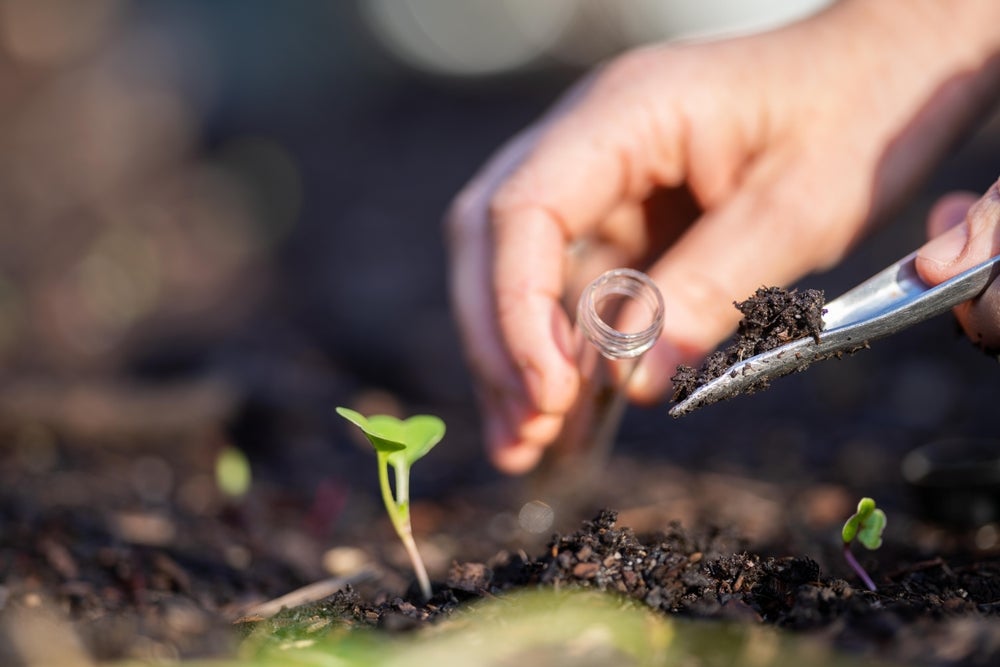Farheen Sayam, the manager of value chain engagement for non-profit WWF Pakistan, is on a mission to rally industry stakeholders to support regenerative agriculture practices for smallholder farmers and address environmental issues caused by unsustainable practices.
An unconventional ally has emerged in the battle against climate change and environmental degradation: regenerative agriculture. This holistic approach to farming, which prioritises soil health, biodiversity, and climate resilience, is gaining traction globally as a sustainable solution for the future of cotton production.
At the forefront of this movement in Pakistan is the Regenerative Production Landscape Coalition (RPLC) initiative spearheaded by WWF-Pakistan and funded by the climate-positive foundation Laudes Foundation.
The project described as a “ray of hope” by Sayam works directly with cotton farmers in the Punjab and Balochistan provinces and textile brands to change practices and business models.
Whilst charitable funding such as the Laudes Foundation is driving progress by supporting cotton farmers to adopt more sustainable and profitable regenerative practices, the long-term success hinges on broader commitment from industry and government stakeholders.
The key question is whether major brands, manufacturers and policymakers will dedicate resources to scale up these farmer-centric programmes that safeguard the environment while strengthening supply chain resilience.
Multi-stakeholder partnerships key to regenerative agriculture success in Pakistan
"The one tagline we have developed here is 'Please come forward to save not only your business but the environment for future generations,'" Sayam implores. "Because in Pakistan, we are not working for ourselves but for the people and the planet."
The RPLC is described as an “innovative jurisdictional model” to promote agricultural systems that conserve natural resources, strengthen communities, and support responsible sourcing for businesses.
As a result, smallholder farmers become more resilient to climate change and gain better long-term yields and diversified income streams whilst brands benefit from reduced supply chain risk and disruptions.
However, achieving this transformation requires a collaborative effort involving diverse stakeholders.
"We're not only working with the public sector, public academia, research, and private sector, but we also have farmer producer organisations on board," Sayam explains. "We are convincing them how these sustainable agricultural practices will be supportive, not just to help the environment but also for cost-cutting in the long run."
She says that the RPLC initiative is not a short-term project, but a “long-term beneficial initiative” that will help support businesses' environmental impact in the future.
Sayam's call to action resonates deeply, as Pakistan grapples with the escalating effects of climate change, including rising temperatures, environmental degradation, and natural disasters like floods.
The floods which began in June 2022 killed nearly 1,200 people and the Government of Pakistan estimated that some 40% of the nation’s annual cotton crop had been affected or lost due to the flooding.
"We have gone from climate change to [now] boiling, globally," Sayam warns.
The Guardian conducted a poll of hundreds of the world’s top climate scientists who warned that the planet's temperature is expected to rise at least 2.5C (4.5F) above preindustrial levels this century with “catastrophic” results for humanity.
“A simple request: please come forward and join Laudes and the WWF Pakistan for this initiative to save your generation," Sayam pleads.
Can collaboration overcome Pakistan's regenerative agriculture challenges?
Besides areas like finance, convincing farmers to embrace the shift to regenerative agriculture shift is a challenge says Sayam. She acknowledges the need to bridge the gap between traditional and organic farming methods and the regenerative approach.
"We are trying to convince the farming community that if you adopt regenerative agriculture, it will not only benefit the environment but also increase your income," she explains.
Complex problems in agriculture require big-picture solutions. However, most efforts to help farmers tend to focus on increasing their profits in the short term. While this may boost a farmer's income temporarily, it often leads to practices that damage the land and cannot be sustained in the long run.
With climate change causing water scarcity, poor infrastructure, and limited market access addressing systemic issues in agriculture needs holistic, wide-ranging solutions that look at the entire system, not just trying to improve things at the individual farm level.
The RPLC initiative hopes to overcome this challenge, by “driving the collaborative forward” with the hopes of involving influential stakeholders. "We have a great governance structure in this project," Sayam notes. "We want to bring the public sector, agriculture departments, think tanks, academia, research institutes, and value chain stakeholders to convince the farmers and industry partners."
Qadir Baksh Pirkani secretary agriculture government of Balochistan says the need to invest in agriculture and build the capacity of vulnerable farmers on sustainable agricultural practices helps mitigate the supply-chain risks caused by climate change.
Sayam adds that WWF Pakistan will establish models and demonstrations to showcase to the rest of the farming community and will need the support of investors, as WWF Pakistan are not directly involved in this initiative.
“Our goal is to bring together the individuals who will engage our stakeholders,” she says.
Recognising the link between sustainable agriculture and secure supply chains, several major textile brands have joined forces with RPLC Pakistan including Artistic Fabric Mills (AFM), Artistic Milliners and Sapphire.
Regenerative cotton producer AFM became the first regen. certified brand in the Pakistan textile sector says Sayam.
"AFM will not only provide training but help us with finances, supporting the farming community to convert from traditional or organic to regenerative agriculture."
Engaging and empowering local women co-workers
Central to the initiative's approach is the active involvement of local farming communities, including female co-workers. Recognising the vital role women play in agricultural communities, the project aims to enhance their participation and ensure fair wages, equal opportunities, and safety.
Sayam makes it clear that the initiative emphasises to stakeholders the importance of involving female co-workers when they start integrating RPLC methods into their companies.
“We do not negotiate on that,” stresses Sayam.
While integrating women into farm operations remains a societal and religious challenge in some areas where female workers aren’t even allowed to work on a farm, the initiative is exploring new and innovative ways to support and uplift farming families.
The RLPC initiative is doing this by drawing inspiration from its success in regions like India, Brazil, and Tanzania with plans to scale and replicate the project. "Initially, we started as a phase in two districts across two provinces," Sayam says. "Long-term, we plan to expand our project in Punjab, including other districts like South Punjab, more climate and environmentally disturbed areas."
Ultimately the objective of the initiative is to better Pakistan's agricultural landscape, aligning with the country's climate change and sustainable development goals.
As Sayam poignantly states: "We cannot make an impact overnight, but at least we have started. My grandkids' grandkids may see the difference and proudly say that their grandmother was part of this initiative."















